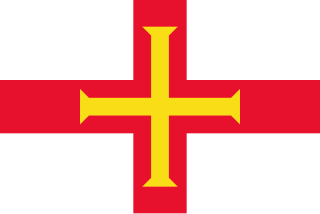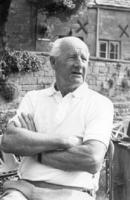
Edward Gibbon was an English essayist, historian, and politician. His most important work, The History of the Decline and Fall of the Roman Empire, published in six volumes between 1776 and 1789, is known for the quality and irony of its prose, its use of primary sources, and its polemical criticism of organised religion.

Guernsey is the second largest island in the Channel Islands, located 27 miles (43 km) west of the Cotentin Peninsula, Normandy. It is the largest island in the Bailiwick of Guernsey, which includes five other inhabited islands and many small islets and rocks. The Bailiwick has a population of 63,950, the vast majority of whom live on Guernsey, and the island has a land area of 24 square miles (62 km2).

The history of Guernsey stretches back with evidence of Neolithic occupation, followed by Roman occupation. Christianity was brought to Guernsey by St Sampson.

John Robert Fowles was an English novelist of international renown, critically positioned between modernism and postmodernism. His work was influenced by Jean-Paul Sartre and Albert Camus, among others.
"Sarnia Cherie" is used as the unofficial anthem of Guernsey, one of the Channel Islands. Sarnia is a traditional Latin name for the island. George Deighton wrote "Sarnia Cherie" in 1911, with Domenico Santangelo composing the tune later the same year.

East Coker is a village and civil parish in the South Somerset district of Somerset, England. Its nearest town is Yeovil, two miles (3.2 km) to the north. The village has a population of 1,667. The parish includes the hamlets and areas of North Coker, Burton, Holywell, Coker Marsh, Darvole, Nash, Keyford as well as the southern end of the Wraxhill area.

John Middleton Murry was an English writer. He was a prolific author, producing more than 60 books and thousands of essays and reviews on literature, social issues, politics, and religion during his lifetime. A prominent critic, Murry is best remembered for his association with Katherine Mansfield, whom he married in 1918 as her second husband, for his friendship with D. H. Lawrence and T. S. Eliot, and for his friendship with Frieda Lawrence. Following Mansfield's death, Murry edited her work.

George Norman Douglas was a British writer, now best known for his 1917 novel South Wind. His travel books, such as Old Calabria (1915), were also appreciated for the quality of their writing.

Roy Dotrice was a British actor. He played the antiquarian John Aubrey in the solo play Brief Lives. He won a Tony Award for his performance in the 2000 Broadway revival of A Moon for the Misbegotten, also appearing as Wolfgang Amadeus Mozart's father Leopold in Amadeus (1984), Charles Dickens in Dickens of London (1984), and Jacob Wells/Father in Beauty and the Beast.

Toilers of the Sea is a novel by Victor Hugo published in 1866. The book is dedicated to the island of Guernsey, where Hugo spent 15 years in exile. Hugo uses the setting of a small island community to transmute seemingly mundane events into drama of the highest calibre. Les Travailleurs de la Mer is set just after the Napoleonic Wars and deals with the impact of the Industrial Revolution upon the island.

The culture of Guernsey in the Bailiwick of Guernsey is a culture which has been shaped by its indigenous Norman language and traditions as well as French and British cultural influences. Cultural trends from immigrant communities such as the Portuguese have also been added.

Upwey is a suburb of Weymouth in south Dorset, England. The suburb is situated on the B3159 road in the Wey valley. The area was formerly a village until it was absorbed into the Weymouth built-up area. It is located four miles north of the town centre in the outer suburbs. In the Census 2001 the combined population of Upwey and neighbouring Broadwey was 4,349.

The Book of Ebenezer Le Page is a novel by English writer Gerald Basil Edwards first published in the United Kingdom by Hamish Hamilton in 1981, and in the United States by Alfred A. Knopf in the same year. It has since been published by Penguin books and New York Review Books in their classics series, as well as in French and Italian.
Gerald Basil Edwards was a British author.
Maurice Nadeau was a French teacher, writer, literary critic, and editor. He was born in Paris.

John Stewart Collis was an Irish biographer, rural author, and pioneer of the ecology movement. He is known for his book The Worm Forgives the Plough based on his wartime experience working in the Land Army in the Second World War.
The Adelphi or New Adelphi was an English literary journal founded by John Middleton Murry and published between 1923 and 1955. The first issue appeared in June 1923, with issues published monthly thereafter. Between August 1927 and September 1930 it was renamed the New Adelphi and issued quarterly. Murry was editor until 1930, when he handed over to Sir Richard Rees and the monthly issues resumed. Rees was succeeded by Max Plowman in 1938. The magazine included one or two stories per issue with contributions by Katherine Mansfield, A.A. Milne, D. H. Lawrence, H. E. Bates, Rhys Davies, G.B. Edwards and Dylan Thomas. The Adelphi published George Orwell's "The Spike" in 1931 and Orwell contributed regularly thereafter, particularly as a reviewer; in the late 1930s/early 1940s, working class writers Jack Common and Jack Hilton also contributed.

This is a list of books in the English language which deal with Guernsey and its geography, history, inhabitants, culture, biota, etc.
The Guernsey Society is an organisation for people with an interest in the Bailiwick of Guernsey.
Edward Chaney is a British cultural historian. He is Professor Emeritus at Solent University and Honorary Professor at University College London . He is an authority on the evolution of the Grand Tour, Anglo-Italian cultural relations, the history of collecting, Inigo Jones and the legacy of ancient Egypt. He also publishes on aspects of 20th-century British art. In 2003, he was made a Commendatore of the Italian Republic. He is the biographer of Gerald Basil Edwards, author of The Book of Ebenezer Le Page which he succeeded in publishing following the author's death in 1976. This has since been recognised as a twentieth-century classic.












